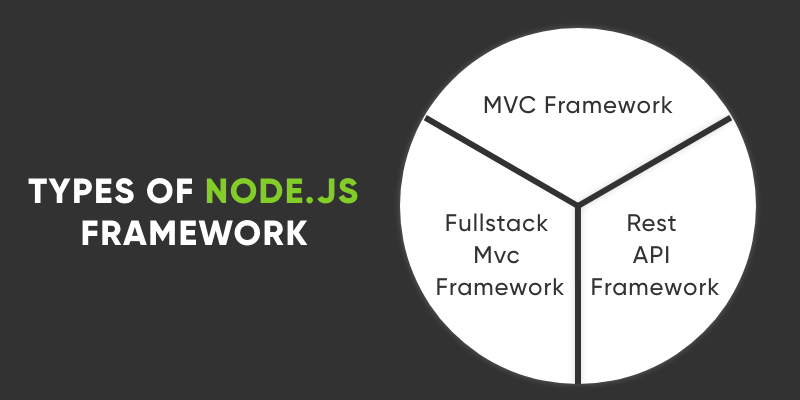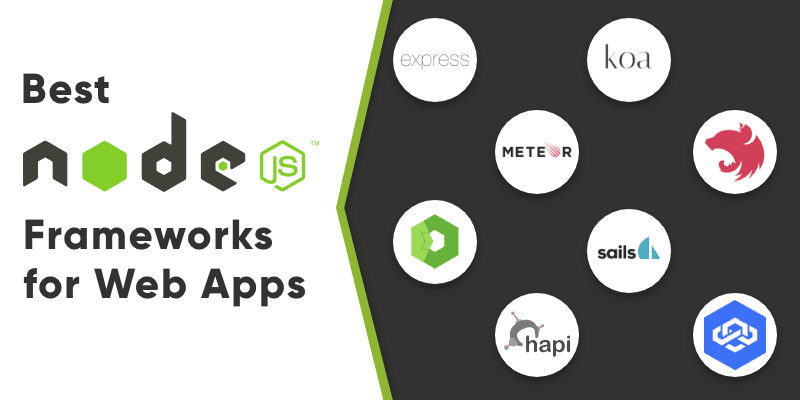With each passing year, numerous technologies, tools, and frameworks emerge and quickly vanish from the industry. In the world of app development, the only consistent thing is change. As matter of fact, everyone is looking forward to the new trends and technologies that will reach the market in the coming year, empowering developers to create great web apps. Best Nodejs frameworks are difficult to find.
Although this may be true, the COVID-19 pandemic has expanded the e-commerce industry like never before, inspiring businesses from all over the world to adapt their traditional business methods to virtual markets. On the other hand, businesses are in a dilemma about which technology to use to develop an application that provides an exceptional user experience in order to survive in the market for the next few decades.
As a result of the increased demand, mobile app development companies are continuing to test various technologies that will enable them to create a future-ready app and offer advanced web app development features.
Not to mention, for many tech experts, the simple answer is to use Node.js frameworks, to build web apps. Here is the information that such survey reports convey.
- According to a survey, about 80% of developers prefer Node.js to other programming languages for their development job.
- According to a market survey, four out of five back-end and full-stack developers choose the Node.js framework.
Additionally, it’s safe to assume that Node.js has drawn the attention of developers all across the world. Correspondingly, before we get into detail about what makes Node.js such an excellent framework for creating online apps, it’s important to have a basic understanding of the framework. For comparing, node js with other frameworks, you can read this blog on Node Js Vs Golang once.
What Is Nodejs Framework? Why Is It Used?
Node.js is an open-source JavaScript tool based on the JavaScript Engine in Google Chrome. By the same token, it’s used to build scalable network applications with a fast and efficient event-driven, non-blocking I/O architecture. On both the server as well as client sides, it allows developers to create code in a single language (JavaScript). Likewise, NPM-Node Package Manager is the sole manager of node.js, ensuring that development time is reduced and optimal results are achieved.
This is hosted on the V8 JavaScript engine. Of course, everyone knows that node.js is based on a single-threaded model, which means that the input and output follow the same path. Nonetheless, the Java Class Library is a collection (or library) of reusable pre-written code that may be used to develop programs, whereas the Java Virtual Machine runs Java programs on a computer. However, Node.js, being one of the most popular scripting languages, can help you with everything from basic code comprehension to client-side scripts, event loops, and other coding jobs.
What Is Node.Js Used For?
Because of its single-threaded nature, Node.js is best-suited for non-blocking, event-driven servers. Conversely, it was created with real-time, push-based architectures in consideration and is utilized for traditional websites and back-end API applications.
Market Insights Of Nodejs
Because of its single-threaded nature, Node.js is best-suited for non-blocking, event-driven servers. Conversely, it was created with real-time, push-based architectures in consideration and is utilized for traditional websites and back-end API applications.
- As per survey results, Node.js reduced development costs by 58%, making it the best choice for businesses.
- According to statistics, Node.js can improve application speed by 50%, which is why 43 percent of Node.js developers utilize it to build enterprise apps.
- Amazon, Netflix, eBay, Reddit, LinkedIn, Tumblr, and PayPal are among the companies that have adopted Node.js.
- It is mostly used for web app development by 83 percent of respondents.
- PayPal has seen a 35 percent reduction in average response time on their page since using Node.js as a backend development technology.
- Node.js is used by around 30 million websites, according to W3Tech.
- According to the survey study, Node.js surpassed one billion downloads in 2018 and continues to grow.
- According to the latest data, Node.js is used by more than 37,000 websites in the United States.
Nevertheless, market statistics, and facts about Node.js, you can be sure that it is gaining traction as a web app development framework.
What Makes Nodejs A Good Choice For Web App Development?
Not to mention, Nodejs frameworks have a variety to select from because it is a fast-growing programming language. In fact, frameworks can assist you in scaling, accelerating the development process, and improving app performance across several projects. With this intention, what distinguishes JavaScript’s framework -Node.js?
- Node.js has grown in popularity as a result of its ability to make web app development exceedingly lightweight and flexible.
- Node.js includes a large collection of JavaScript modules that make the app development process easier.
- It has become quite popular for web and mobile app development companies because of its open-source framework.
- Because Node.js has a clean and compact codebase, it’s ideal for rapid development and prototyping.
- It has a large community and support because it is built on the JavaScript programming language.
- Node.js is a popular framework for quickly creating enterprise-scale applications.
Features Of Nodejs
- Because JS APIs are asynchronous, a Nodejs server never has to wait for an API to return data. Instead, it simply travels after requesting data.
- It executes code quickly.
- The single-threaded model is used by Node.js.
- There are no buffering issues because data is transferred in chunks.
- Google designed and maintains the JS runtime environment.
Types Of Nodejs Framework For Web Applications

MVC framework
With this in mind, these nodejs frameworks are well-known for their excellent design patterns, which separate the entire application logic into three main components: models, views, and controllers. For example, Express.JS is the most widely used MVC framework among developers all around the world.
Fullstack MVC framework
For developing real-time mobile applications, such frameworks include plenty of scaffolding, libraries, layout engines, and other useful development tools. Not only front-end but also back-end development are simply handled and supported by these nodejs frameworks.
Rest API framework
As a matter of fact, the Nodejs frameworks are well-known for their remarkable ability to construct apps with pre-built REST API experiences. Of course, developers don’t have to bother about layouts because these frameworks provide a ready-to-use programming interface, which saves time and effort.
Best Nodejs Frameworks 2023 For Web Applications
Express.JS
Uniquely, with the most GitHub ratings, Express is the most popular, quick, and MVC-based framework. Then it comes with a variety of libraries and components that work together with Nodejs frameworks to create stunning and powerful dynamic web apps.
Furthermore, the popular JS framework is not only restricted to web apps; it can also be used to create increasingly popular mobile-based web applications. Of course, it can also be used to create and surf APIs for web pages. Similarly, ExpressJS comes with all of the HTTP utility methods, functions, and middleware that developers need to create reliable APIs.
Features of Express
- We can create single-page and multi-page web apps with Express.
- It is built using the MVC framework, which makes it simple to implement.
- It can install middleware, allowing a developer to react to HTTP requests.
- ExpressJS includes several routing libraries that work in response to HTTP requests.
- It has the ability to create powerful APIs.
Koa.JS
In the first place, it is an MVC-based framework designed and developed by the Express team, Koa may be considered an extension of the Express framework. By the same token, the major goal of Koa is to provide a framework that is lighter than Express and capable of more quickly developing web apps and APIs. Despite having fewer libraries and components than Express, Koa.js includes a lot of new functionality. Provided that Koa’s error handling capacity is significantly superior to that of the Express framework.
Features of Express
- It has a lot of new and unique features.
- It makes use of the Asynchronous function, which eliminates the need for callbacks.
- Other Node.js frameworks can’t handle errors as well as Koa can.
- It has several generic built-in features, such as cache freshness, content negotiation, and proxy support.
- It has the syn/await keyword, which handles and cleans the code for you.
Meteor.JS
Meteor is a full-stack framework that allows you to build real-time web and mobile apps. Being that, it’s one of the best cross-platform frameworks that works on iOS, Android, and the desktop. IN general, MeteorJS has the ability to integrate with other prominent technologies such as front-end frameworks and database systems such as React, Vue, Angular, and MongoDB, to name a few.
In fact, Meteor is more similar to the JavaScript syntax than other Nodejs frameworks, making it easier to grasp and learn for JS developers. To enumerate that is why many developers use Meteor.js for back-end development because it allows them to code for the entire website with just one programming language.
Features of Meteor
- It has the ability to create web applications for any device.
- It supports the top three front-end web frameworks, Angular, React, and Vue.
- Meteor is also compatible with NoSQL databases like MongoDB.
- It’s not too heavy.
- It comes with several libraries that can be used to create dynamic web applications.
- Meteor.js has a rapidly rising user base.
- For a full-stack developer, it is the best framework.
- The documentation is well-organized.
Nest.JS
TypeScript, not JavaScript, is the primary programming language used by Nest.js. To clarify, it is a Node.js Rest API framework for creating scalable and efficient server-side applications. In general, TypeScript, its native language, gives it powerful features including object-oriented programming, functional programming, and functional reactive programming. To emphasize, Nest.js also has a command-line interface (CLI) that developers can use to link it with other frontend tools.
Features of Nest.js
- Its native programming language is TypeScript, which is a superset of JavaScript.
- Many programming paradigms, like FP, OOP, and FRP, are included, making it more scalable.
- NestJS uses a modular approach in which libraries are organized into distinct modules.
- Because both JS frameworks use TypeScript as their primary programming language, it works well with Angular.
- It also makes use of some of the Express options.
- Its command-line interface allows programmers to integrate it with a variety of tools.
Total.JS
It’s an MVC-based framework for building web apps, real-time applications, and REST APIs. Total.js was released in 2013 with the primary goal of creating a framework that is complicated, stable, and free of dependencies. It includes a number of libraries, packages, and other components developed entirely in Total.js.
Features of Total.js
- It’s a free and open-source framework.
- Total.js allows you to connect to strong NoSQL databases.
- It adheres to the MVC model.
- WebSockets are provided by Total.js for real-time applications.
- The native programming language is JavaScript.
- It has a lot of UI elements in it.
- The SMTP mail sender protocol is supported by the Node.js framework.
Sails.JS
The Express framework is comparable to SailsJS. Despite this, several developers, including Sails, claim that it is better than Express. This is primarily due to the fact that it includes numerous features that Express does not. If we compare Sails.js vs ExpressJS using features as the key criterion, the former offers more promise.
Sails is a Node.js framework that is lighter and faster than Express. It’s also one of the greatest Node.js frameworks because of its integration with a variety of popular backend and frontend technologies. It has an ORM feature that allows it to work with any database system, including MySQL, MongoDB, PostgreSQL, Redis, and local disc.
Features of Sails.js
- It’s written entirely in JavaScript, making it simple to understand.
- It offers REST APIs that are generated automatically.
- Sails.js and WebSockets can be readily combined.
- WebSockets are provided by Total.js for real-time applications.
- Its ORM (Object Relational Mapping) feature allows developers to connect the web framework to any database management system.
- It can also work with any type of front-end technology.
- Sails.js, like Express.js, can handle any sort of HTTP request.
Hapi.JS
Hapi is a strong and reliable of many Nodejs frameworks created by Eran Hammer at Walmart in 2011. We can create sophisticated APIs and server-side scripting apps with hapi. It is also known as the server framework, and it enables the moving of data between the server and the client through APIs. Express is comparable to Hapi, however, it has fewer functions. Some developers even recommend hapi as a good alternative to Express, however, it lacks a large community.
Features of Sails.js
- To be sure it ensures that requests are handled appropriately.
- It has the ability to create APIs that are both reliable and efficient.
- To clarify, no middleware is used in Hapi.js.
- In fact, caching, authentication, and input validation are all built-in.
- No middleware is used in Hapi.js.
- In general, it’s compatible with a variety of other applications.
- Various types of databases are supported by the Node.js framework.
- In fact, one of the greatest Node.js frameworks for real-time applications is Hapi.
- It includes the JavaScript Templating Engine, which makes dynamic web page rendering simple.
Also Read:
LoopBack
LoopBack framework is an open-source for building dynamic and sophisticated REST APIs. It also comes with a simple command-line interface that makes it easy to combine with other front-end technologies. It allows interaction with several databases, including relational and NoSQL database management systems such as MySQL, Oracle, MongoDB, and PostgreSQL, because it can be used to construct REST APIs.
Features of Sails.js
- In particular, it aids in the creation of APIs with minimal code.
- Notably, LoopBack works with a variety of databases.
- Chiefly, the developers can use it to generate SDKs and API documentation.
Derby.JS
By all means, Derby is a Node.js framework that can be used to create web-based apps. It’s a great framework for creating both desktop and mobile web apps. Although it has a tiny community at the moment, the Node.js framework has a huge amount of potential. Data synchronization, real-time concurrency, API, and the ability to construct dynamic web pages are just a few of the capabilities it offers.
Features of Derby.js
- To clarify, Derby Racer, a data synchronization engine that synchronizes data between the browser and the server, can be integrated.
- In detail, we can do bi-directional scripting with Derby.js, which means we can deal with both the server and client-side of the component.
- It’s made up of a lot of basic Nodejs frameworks.
Mean.JS
Indeed, Mean.js is a full-stack MVC-based Node.js framework designed to give cloud-native full-stack JavaScript applications an easy and enjoyable starting point. Certainly, MongoDB, Angular 6, Express, and Node are the acronyms for Mean. Moreover, today’s popular technology includes all of these tools.
MongoDB
It is a NoSQL database that allows applications to store data as JSON (JavaScript Object Notation) documents in the backend.
Express (also referred to as Express.js):
It is a Node.js -based back-end web application framework.
Angular:
It is a front-end web app framework that allows an application’s UI to be dynamic by running JavaScript code in the user’s browser.
Node.js:
It is a JavaScript runtime environment that allows you to write the backend of your application in JavaScript.
Features of Mean.js
- It’s a blend of the most cutting-edge technologies.
- Both front-end and back-end technologies are included.
- Cloud computing is possible with NoSQL.
Conclusion
Although, each of Nodejs frameworks contains characteristics that distinguish it from the others. Thus, you can use any of these frameworks to improve your JavaScript skills and build dynamic web applications using back-end technologies. However, that the Node.js framework you chose matches your project’s requirements.
Notably, we hope that this article has helped you find an appropriate framework for your project. Still confused?
With this in mind, you can get in touch with the mobile app development company and get your doubts cleared.
Echoinnovate IT is the best web and mobile app development company with over a decade of experience. Contact our offshore Nodejs developer now!
FAQs
What language is node.js written in?
Node.js is written in C, C++, and JavaScript.
What is node.js?
Node.js is a free and open-source framework that uses JavaScript on the server to build fast, lightweight and scalable web applications. Thus, it can run on various operating systems’ platforms, including Mac OS X, Unix, Linux, Windows, etc.
Is node.js a programming language?
Node.js is not a programming language. Provided that, it’s a runtime environment that runs JavaScript outside the browser.



